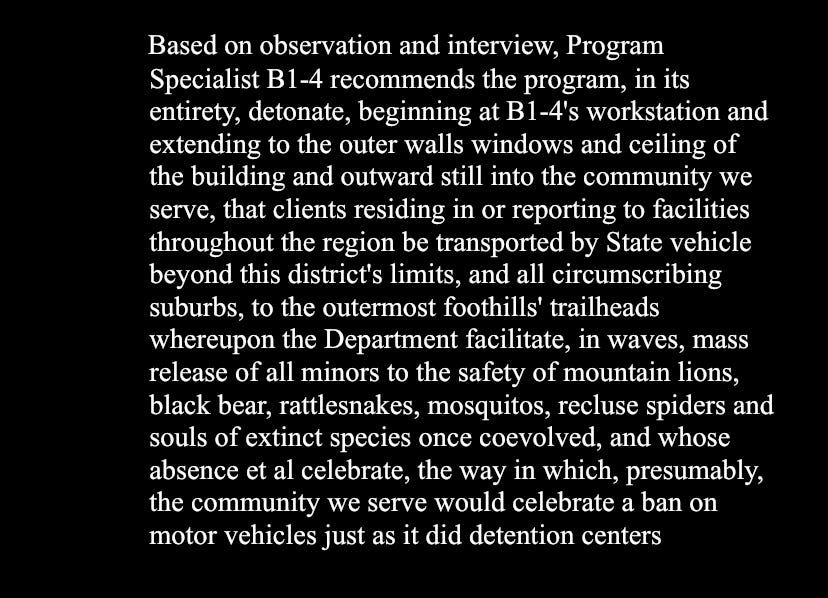At lunch I smuggle white books into the African-American Past and Present Library, its doors solid mahogany. I plant my feet to row them but they blow open as church doors, as saloon doors, as knocked over boxes do—some mystery of Jesuit hingemanship.
Not trolling, even a little, I sit bracketed in black bookshelves and lean over my contraband.
Today it's Mirrors by Eduardo Galeano (a white Latin American). As warm as Mirrors is it won't help me outside. The squirrels have gone frozen in crosswalks to squirrel flavor-dispensers for rats who pop under tires while feeding. A former rat can freeze and pedestrians in their phones sometimes slip. I see a college girl, mid videochat, fold ass-first between Brinks truck tires. I see an older lawyer-type processed by public transit same as a dead leaf traveled over by grandpa's bright red lawnmower. Streets outside the AAPPL can be messy. Part cathedral, part file cabinet, it catalogs African America. I open Mirrors to a wardrobe of peoples, every color karate belt. I smuggle white books into the warm AAPPL on cold days' lunches—books more diverse than the library.
What I fail to remember, break after break, is I am contraband in the AAPPL. The white Head Librarian greets it out of me—his glasses and mouth beat the rest of his head to my face: "Can I help you?" I unlock my phone, motion for him to swipe. Images of my mother and father slide forward, followed by their mothers and fathers—people in the photos unbraid and typify, Blacker and more Japanese the deeper down my gallery.
"I thought maybe Filipino," he says.
"My childhood torturers."
"His entry fee," he writes on a visitor pass, "is satisfied by data in his phone."
I see myself from the outside for the first time all day.
"Did you feel it leave your body?" he asks, peeling the pass. A sticker.
The work I am on break from is in discarded children, or when things go wrong for discarded children, a steady way to pay rent. Not a growing field but inflating. Job security: not quite right. The work is steady the way a child-sized hole in our boat and us armed with shovels is steady. I hunt, administratively, grown women, occasional men. Caregivers we call them. They call us clipboard commandos of a hulking state bureaucracy. What I mean is, no, you don't feel it leave your body. You wake up next to a battered lover and that is the alarm, as it was for one young man whose statements I used to take. Aged-out of the program four years he texts me: "a male neighbor banging on your door looking over your shoulder into your apartment at your girlfriend, going Everything alright miss? puts you in the dictionary real quick and forever."
My version being maturing into what looks Filipino—the years fifteen to thirty-five an involuntary visit to a gradual, transracializing Zoltar machine.
The librarian smacks the pass to my chest. "Enjoy the facilities," he says, reaching for my copy of Mirrors, "but I'll have to keep that up front."
Bookless in the library, having read The Autobiography of Malcolm X, White Girls by Hilton Als, The Fire Next Time, even Jews, Slaves and the Slave Trade—when the librarian returns I haven't left the entryway and am reading the ceiling, or what underlines the ceiling, a kind of building's internal headband blocked by any brim of a hat: EMERSON LONGFELLOW POE IRVING HAWTHORNE THACKERY DICKENS ELIOT BYRON DARWIN WORDSWORTH REMBRANDT KANT GOETHE SPINOZA TURGENEV CERVANTES--
A deaf girl—who may be an older lady but registers as a girl—erupts now and then with hearing-impaired vocalizations (the hearing sound this way with the wind knocked out of us), and, on some schedule programmed into her, migrates from one end of the library to the other misshelving books. Another deaf white woman of about thirty, dressed a notch above homeless, but with a great body and a kind of undistracted intelligence in her face, tries wrangling the lady-girl but abandons her to stop a shrunken Black man in a motorized chair from picking at the corners of an antebellum lithograph (left exposed for some reason). She gatekeeps, fists on hips. He grins, rotates, rolls away. She sits her body down on the steps of children's literature and falls into her phone.
TO BE SOLD. A parcel of likely NEGROES, imported from Africa, cheap for Cash, or short credit with Interest; inquire of Mr. Avery, at his House next Door to the White Horse,
TURGENEV CERVANTES RACINE BACH MOZART WAGNER–
The lady-girl's scalp sawing the room, between the shelves.
his House next Door to the White Horse: Also if any Persons have any Negro Men, strong and hearty, tho' not of the best moral character, which are proper Subjects for Transportation, Will consider exchange for Small Negroes.
My report, blocks away, cursor blinking mid-sentence, is not of the best moral character.
"Try this," the librarian says.
"Not a Genuine Black Man," I say, holding the book at phone level.
"A True Story," he says, completing the title. In the author photo: a dark-skinned man with no accent, cheesing in spite of himself. "Let me know if you need anything," the librarian says, getting smaller with his back to me, having just closed a sale in a nonprofit environment.
Anywhere but the office when a lunch break thins down—one made-up word, oppressurization.
Maybe you're around the corner at your Salvadoran spot, or you've walked as far from the office as time will allow, up against some fence and a freeway overpass, counting the swift suctions of flatbeds on the span overhead, and it seizes you the fact that the entire world is accessible, that this moment you could visit the restaurant you've been curious about in the district not crawled by your GPS, or the airport—you wouldn't have to approach a kiosk, just loiter around the check-in area, and later baggage claim, watching human tides pour in and go out, and after so much flux you might select a standby ticket more or less blind, and end up somewhere in the middle of the country, first a hub, Denver or Houston, then a short shuttle to an overlooked town where an unfertilized relationship stood still for you, and would have remained inactive permanently had you not taken up the randomness on offer by immediate infrastructure.
But you don't and can't because your shoes are on rails made from previous footfalls that terminate back at your desk.
I am on those rails sliding out of the AAPPL's main room, Not a Genuine Black Man still in my hand, my finger up it, keeping place. A scrub jay has gotten in, perched above the reception area; I notice because both security guards in tight navy sweaters—the only genuine Black men in the AAPPL ever—have their faces trending upward when I walk in.
"How he get in here?" the younger, thicker guard says.
"Loading dock," the older, thinner one says.
"Wasn't me left the door up," says the younger, "I'll tell you that."
I stop and look up too, at the bird, because I want to be one of the guys.
It is perched on a wall sconce roughly U-shaped, empty on the candle-holding end, maybe thirty feet above and to the left of the front exit—a brilliant male, eyeballing us in that electronic way urban corvids can, as though the full side of its head is a lens.
Young-thick says, "How we gon get him out?" He starts to sidestep and backstep with nowhere to go, as happens on public sector shifts in the face of unsupervised novelty. The legs simply activate.
"Let him be," older-thinner says, tapping the reception area's Samsung awake. "They still got Door 3 open?"
"Yup," says younger-thicker, orbiting the floor insignia.
"Then let him be. He'll figure it out. Keep staring up on him like you're doing, he'll stay bothered with you. Go about your business. Ignore his ass. He'll follow the fresh air out."
Neither man acknowledges me. I'm of the scene not in it. They probably know me as the Statey who acts spectrumy on sign-in. But between the two, I'm with younger-thicker. The bird is hard not to look at. It's upsettingly big and the healthiest blue against a mahogany wall. Below it lies a plaque raised and varnished from that wall.
THIS BUILDING IS
THE GIFT OF
ANDREW CARNEGIE
An ocean-in-a-sea-shell shush fades in from the street, from around the corner where the bathrooms are. The loading dock must be. We three break in that direction.
People still walk their dogs downtown. There is feces every so often—ours, theirs.
MLK is four lanes and two shoulders. The shoulders are metered parking. Some of the nicer cars have signage on-dash: doors unlocked/nothing of value/please check. Every space is taken and all meters blink red. Someone, a shopkeeper probably, has been paying housing-insecure fixtures of the neighborhood to stack roadkill in rectangles of dirt between sidewalk and curb. Possums mainly, today. Their coats, gray with particulates, have accumulated since garbage day; they bring to mind, first, sandbag bunkers, then old footage of bulldozed bodies, but these stacks have smaller, darker bodies darting over, along, and into them that disrupt unforgivable historical comparison.
The deaf white woman with the good body is on the opposite side of the street, traveling as though from the State Building—the building containing my office—and making her way back toward the AAPPL. Perhaps she left something behind. From this distance, this wide angle, it’s freakish how well aligned she is—volleyball player-tall but not the least bit lumbering or gangly—just straight up and down and kind of hovering as one might on sneakers made of centipedes or as a wig on a wheeled coat rack. She passes behind a Safeway truck. When I see her again a kid in his twenties is dancing alongside her, facing her, his back to the street, to me, up on her, sideways, crablike: “What up? What up? What up? What up? What up?” He leans in close, “Fuck you then.” I didn’t even notice the lady-girl, who passes the failed dancer as he peels off down the street. She presents the deaf woman with a glossy spread in her borrowed book, and vocalizes something I can’t understand, clearly fascinated and sharing. A day program, must be—the lady-girl, the shrunken man (who they probably just dropped off), and her, a player-coach of sorts, a real bargain for County or State. They walk up to a sinewy white guy with scabs on his shins who’s been waiting for them on a flat hydrant. About her height, which is tall for a guy, he puts a road bike frame on his shoulder and his arm around her and they all three enter a duplexed Victorian.
The book in my hand doesn’t feel like mine. I look and it’s Not a Genuine Black Man. How bad is it to have stolen this book?
How bad is it that they still have my Mirrors? This book in my hand is public property, City property, and I’m a public servant, a mandated reporter. I am also an AAPPL regular. But having left Mirrors behind, is this remuneration? Did I troll them after all? They me? How bad do I want not to buy another Mirrors copy because I hate rebuying books but at the same time should rebuy this one because when asked for my favorite titles I invariably name this book and not owning an all-time favorite title is turning a corner onto a kind of personal incoherence one associates with old age, versus entering the office late from lunch, which I am a lot lately, noticeably so, versus being a good Black man and returning this Black literature to the Black library made possible by white wealth and railroads and an all white staff, or would bringing back a library book in general be more good Asian?
There are signs in many windows down here that have nothing to do with governance or commerce. They have the feel of inactive social media profiles no one's bothered taking down.
Increasingly the street is in denial about these signs; it knows, on some level, that if this were Candyland the signs would read something like Gingerbread lifeforms welcome here. Tourists who hang around long enough discover this city wears a name tag on a date with its wife, that it has videoed itself in a mirror touching itself to another mirror, that every day in this city a child is born who, before the age of consent, will tattoo their own usernames and passwords head to toe. And by the time the child's parents have the last tattoo removed therapy will be decided against. Not due to the removal's expense but to its serial nature. The parents will be allowed, over the course of the removal, sufficient time to think and decide that therapy itself may be responsible, however indirectly, for the blank patches of skin propagating on their child. It's just that kind of city now. It's a city that people in the places I don't fly to at lunch are afraid everybody in will fly away from all at once. Little do the people from the places I don't fly to know, the refugees they're afraid of aren't from my city. They're from towns like theirs. They converged upon my city long ago instead of sticking with you and yours and keeping up a marriage, which anyone's relationship with home forever is. No, my city is not their home, it is the brand-relationship they want in on so bad they’ve convinced themselves it’s home. Calling my home "home" defines them as the sort of spirit that migrates from family until it hits ocean.
With a cheek to the street black ice isn’t black, it's just very thin ice.
Watching my own blood peninsula make its way down MLK, I'm worried it might start steaming at the edges. Then I worry it might touch white lines that bookend the crosswalk. What happens if the blood from my sleeve grows so long that it leaves the crosswalk, crawls up onto the curb, soaks the possum stacks and inundates them, penetrates behind them, regroups, and heads back up the steps, and under the mahogany doors into the AAPPL, finds my copy of Mirrors and retracts retracts without anyone stepping on it or tires rolling through it or the heat hardening a film on the surface of it or drying it flat or compositionally altering it whatsoever, no interruptions at all? I once saw a series of renderings of the root structure of an old-growth forest and it’s impossible not to see a network in those images, some kind of cognition being aimed for—that same whatever it is is in my body right now but every line within the network is made of bee sting and it’s throughout the space below my neck, and my neck is in a position like some formal swim stroke and I’m taking a breath but instead of water Martin Luther King. And wouldn’t you know it, the Head Librarian and other white people are blowing out of the AAPPL, sprinting. The librarian’s hands move from the sides of his face to raised shaking in front of him. He is trying to evoke something out of the sky. He kneels down next to me like he’s known me forever. Like I am his little doggie






Compelled as usual to read through your work here. (And thought I’d read some before). Not always following yet following. Side note you’re likely already aware of: Carnegie, apparently fearing for his soul, became a philanthropist after realizing his unpunished participation in the yachting on a manmade lake whose dam, ignored, broke and drowned thousands in the Johnstown Flood. His libraries have since learning of this, always are slightly flooded with debris and water, and forever haunted.
God damn, man. As usual, I have stuff to do, and can’t read this whole piece today, but I archived it. Just another reminder that you are one of the smartest people on here, a writer we desperately need. Keep it up, and if you write a book, please let me know. Especially if you need me to write the introduction.